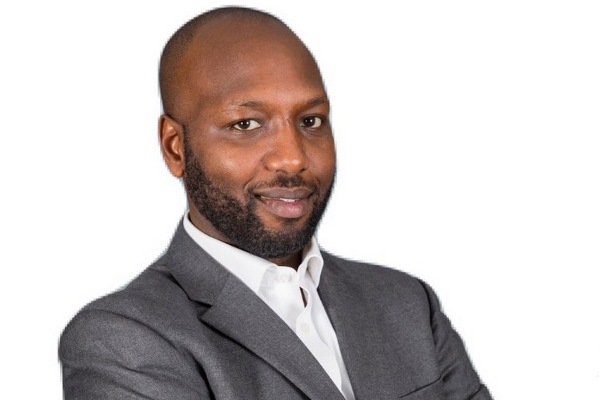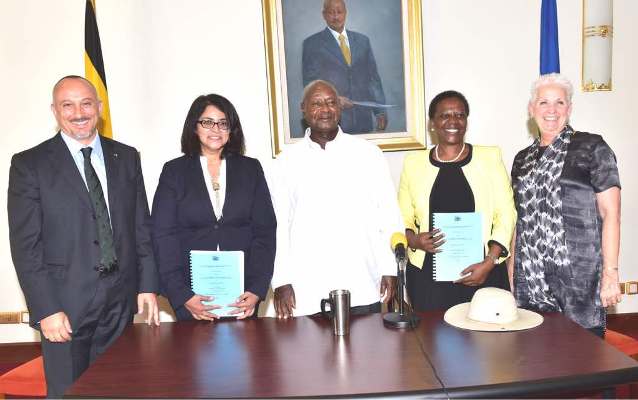A section of MPs Tuesday afternoon claimed that Kwame Rugunda (pictured), a son of Prime Minister Ruhakana Rugunda is among people running pyramid schemes that have seen many Ugandans lose money.
This came out as MPs debated a statement tabled by David Bahati, Minister of State for Planning on the fraud surrounding cryptocurrency and pyramid schemes.
Western Youth MP, Mwine Mpaka, without mentioning names called out Minister Bahati to stop duping Ugandans because a son to one of the cabinet members is managing one of the biggest schemes in the country.
“The ministry actually knows these companies and is keeping quiet. One bishop is operating one company and is using church to hire people and is guarded by Uganda Police,” Mwine said.
It was Rubaga North MP, Moses Kasibante who brought forward Kwame’s name.
However, Minister Bahati said he is involved in blockchain technology not pyramid schemes.
“It is true Kwame is son to Prime Minister Rugunda and he has organized conferences of block chain technology. He isn’t involved in pyramid schemes; he is involved in block chain technology,” Bahati said.
Against the above background, Business Focusexclusively interviewed Kwame about MPs’ claims and the kind of business he is involved in.
‘I run a technology company’
“The MPs have wrong information, I do not run a pyramid scheme, but rather I run a technology business that develops blockchain solutions. There is a lot of misinformation and misunderstanding in the public domain about cryptocurrencies and ponzi schemes, and the claims by our MPs unfortunately represent this misinformation,” Kwame says.
He adds: “Cryptocurrencies and ponzi schemes are two fundamentally different things, and this is important for our MPs and society to understand. Once this is clarified, then a more sober discussion can begin on what exactly cryptocurrencies are, why they are making news headlines around the world, why countries like China and Sweden are creating their own national cryptocurrencies, why global banks like JP Morgan and conglomerates like Facebook, Walmart and Amazon are looking into their own cryptocurrencies, or why institutions like World Economic Forum, the World Bank, IMF and the UN are looking into standards, regulation and utility for cryptocurrencies.”
He reveals that the public debate in Uganda on cryptocurrencies needs to shift from focusing on the ponzi schemes, to a deeper critical consideration by leaders and citizens to understand what exactly cryptocurrencies are, and what impact they will have on our society.
“I am familiar with cryptocurrencies because they are developed using a technology called blockchain, which I work with. Many of the applications developed through blockchain technology take on the “crypto” prefix because blockchain uses strong cryptography to secure its transactions. Based on this “crypto” prefix, these applications are referred to as crypto-assets, and some of these include crypto-currencies, crypto-kitties, crypto-wallets, crypto-funds, crypto-tokens, etc.” he explains more.
Deeper understanding of blockchain
Asked to shed more light on blockchain technology and how it works, Kwame says similar to how internet is a technology that enables people to transfer digital information, blockchain is a technology that enables people to transfer digital value.
“Through the internet, we can directly transfer digital information like email, pictures, and videos from one person to another, but we are not able to do the same with digital value like contracts, money, land titles and other digital assets. For this reason, the internet greatly advanced some industries like the mailing system, while it greatly damaged others industries like copyrights,” he says, adding that blockchain technology solves this problem, and enables for digital value to be uniquely and securely transferred directly from one person to another.
“Blockchains are greatly impacting industries that require trusted 3rd parties or middle men in order to transact, some of these include finance, legal, insurance, logistics and others,” he says.
What he does
He says he works with a technology company called CryptoSavannah (www.cryptosavannah.com ) where they are leveraging the capabilities of blockchain and emerging technologies to create new possibilities for Africa.
“Our focus is on developing blockchain solutions, training and providing advisory services, and we work with governments, private sector and development partners,” Kwame says.
He adds: “We have also led the 2 major Africa Blockchain conferences held in Uganda which hosted President Museveni as keynote speaker in 2018, and the President of SierraLeone, H.E. Julius Maada Bio as the keynote speaker in 2019. As an African thought leader in blockchain technology, CryptoSavannah’s work has featured in various international media including Forbes Africa, Legal 500, BBC, Yahoo News among others.”
On what distinguishes the work of CryptoSavannah’s from the work of companies like OneCoin, he gave a 2 step approach to illustrate his point.
“Firstly, I will draw a
distinction between “technologies” and “applications”.
Similar to how a technology platform called the internet has applications
like email, facebook and Whatsapp, there is also a technology platform called
blockchain that has applications like cryptocurrencies, smart contracts
and other crypto assets,” he says.
Secondly, he says, a Ponzi scheme is a fraudulent investing scam promising high rates of return with little risk to investors.
“They generate returns for older investors by acquiring new ones, but this scheme eventually collapses. These ponzi schemes are common around the world, and are rampant especially at the onset of new opportunities, where they masquerade as part of the new opportunities, yet in actual sense they are deliberately taking advantage of ignorance, and defrauding people who are genuinely looking for investment opportunities,” he says.
He adds: “This is the exact description of OneCoin, which claims to be a cryptocurrency, but is in actual sense a ponzi scheme that is purporting to be a cryptocurrency. It is a scam using the cryptocurrency and blockchain phraseology to execute their fraud, and yet in actual sense lack the basic characteristics of a real cryptocurrency or blockchain company.”
He emphasizes that his company, CryptoSavannah focuses on developing blockchain solutions, while OneCoin is a ponzi scheme purporting to be a cryptocurrency.
“There are hundreds of legitimate cryptocurrencies, like bitcoin, ethereum, ripple and others, however OneCoin is not one of these,” he says.
He adds: “Our company is part of the Blockchain Association of Uganda, which is the umbrella body of different blockchain and crypto businesses in Uganda.”






